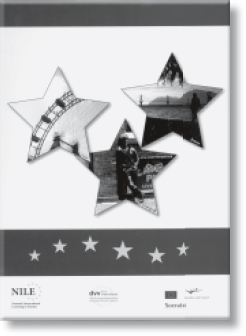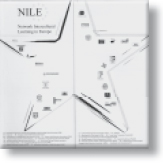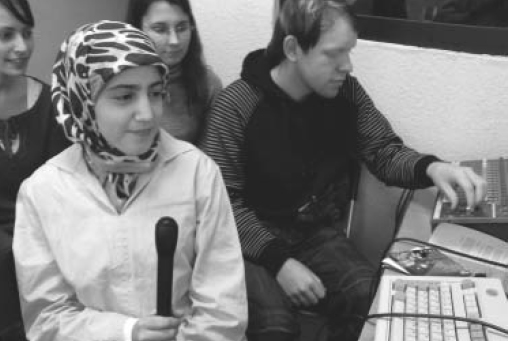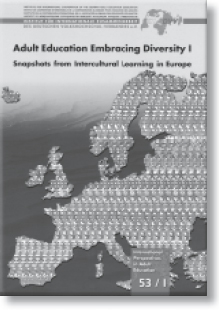Beate Schmidt-Behlau
Intercultural Learning and Diversity Management
DVV International has always been deeply involved in intercultural issues alone through its orientation of learning in partnership on an international scale. Through additional financing by the European Commissions SOCRATES and Lifelong Learning Programmes the institute has been involved more deeply in the issue by coordinating different projects under GRUNDTVIG since 2002, namely “Tolerance and Understanding Our Muslim Neighbours” (TUM 2002 – 2005), the “Network Intercultural Learning in Adult Education” (NILE 2002 – 2008), INTERtool (2005 – 2009) and as a partner in the project “Religious Diversity and Anti-Discrimination“ (2005 – 2008), in which training materials on the issue are being developed. In the framework of these projects the issue of intercultural learning and diversity man agement have been the focus of intensive discussion amongst different European organisations working in the field of adult education and many of the products and outcomes can be seen to have a sustainable value to be used in non formal settings and also to be transferred to other than European contexts.
With the following we would like to share some of the most interesting results generated from the NILE project with the readers. The work of NILE is continued in form of a virtual working group under the roof of the European Adult Education Association, EAEA.
Migration Brings Challenges to Adult Education
NILE’s focus and objectives was to find good practice approaches to intercultural learning delivered in the different countries of the European Union, in which migra tion has brought real challenges not only to schools but also to the field of adult edu cation. All of them have practically become multiethnic in the last 10-15 years.
To cater to the diversity of education needs in multiethnic societies a paradigm shift is needed to value ethnic minorities and migrants in their role as change agents with a right to occupy public space and to influence the future shape of Europe’s member states. Minorities and migrants themselves should participate in the re quired process, in which the principle of equality is reconciled with the recognition of difference, while safeguarding ethnic minority traditions, and including diversity in the national public sphere.
Of the four pillars of education for the future spelled out by UNESCO and Jacques Delors – learning to know, learning to learn, learning to be, and learning to live together – the clear priority here lies in learning to live together. Consequently, “in tercultural education” and “intercultural learning” are not restricted to formal educa tion and need to have a transformative goal, enabling individuals to modify their present beliefs, values and judgements as needed or live in diverse societies.
Results of the NILE Project
The state-of-the-art on intercultural learning in the partner countries was established on the basis of key questions about politics and society, agencies involved, set tings, target groups, training approaches and participation by ethnic minorities. The approaches, definitions and political objectives of the different countries ap peared diverse.
Factors in the success of different approaches to intercultural learning were identi fied through examining case studies. The compiled case studies give a picture of the diverse forms in which intercultural learning can take place. Experiences were broken down into categories according to their specific focus, covering dialogical concepts, empowerment, capacity building and other examples. Some case stud ies offered the opportunity to identify “Guiding Principles of Intercultural Learning“ and demonstrate how they have been applied for example in Austria, Finland and Germany.
“Empowerment and capacity building” was by some case studies established as a crucial first step towards intercultural learning. Examples from Belgium, Latvia, the Netherlands and the UK illustrate success stories.
”Intercultural learning” often takes place outside a structured educational frame work. The collected case studies come from Bulgaria, Cyprus, Hungary, Poland, Romania and Spain.
Findings from Country Outlines and Case Studies
Four basic conclusions can be drawn from a general analysis of the country outlines in NILE.
1. At a general level, intercultural learning is linked to the wider field of human rights, rights of minorities and migrants and the Geneva Convention on Asy lum, and to the fight against discrimination, racism and xenophobia in the context of internationally recognized principles.
In all European countries national constitutions and laws guarantee some kind of freedom from discrimination (mostly linked to the labour market), and where this is not already the case, the EU anti-discrimination directive is pushing for greater enforcement in national law. Some countries have set up public monitoring bodies, some have launched campaigns, and most countries have at least an ombudsperson responsible for either minority or migration matters. Some of these ombudspersons have the right to investigate all proceedings or measures that may infringe rights, and to submit proposals for legal remedy. Also, all EU member states have ratified most of the important international Conventions, such as the “Convention on the Protection of Minorities 28 (IIII)” (Council of Europe), which aims at securing the immigrants’ human rights.
2. Only few countries have until now embraced the concept of cultural diversity as enshrined in Article 2 of the UNESCO Universal Declaration on Cultural Diversity.  Belgium demonstrates in a positive way for governments to be explicit about the reality of cultural diversity and its implications, shown by the following quote: We want to bring into our Flemish cultural policy that kind of diversity that characterizes our society not as a problem, but as a desired reality. Therefore we introduce the design of interculturality into the cultural policy as an explicit goal. To invest in the education of the community and in the (inter)cultural activation is an important start for a real and a positive intercultural society, where every person stands central. (Policy documents 2004 –2009 of the Ministry of Culture of the Flem ish Community). All other countries are somewhere in between, ranging from a gen eral lack of awareness of inter cultural learning needs, as seems the case in Cyprus, to early stages of an awareness-raising process, as this quotation from Bulgaria shows:
Belgium demonstrates in a positive way for governments to be explicit about the reality of cultural diversity and its implications, shown by the following quote: We want to bring into our Flemish cultural policy that kind of diversity that characterizes our society not as a problem, but as a desired reality. Therefore we introduce the design of interculturality into the cultural policy as an explicit goal. To invest in the education of the community and in the (inter)cultural activation is an important start for a real and a positive intercultural society, where every person stands central. (Policy documents 2004 –2009 of the Ministry of Culture of the Flem ish Community). All other countries are somewhere in between, ranging from a gen eral lack of awareness of inter cultural learning needs, as seems the case in Cyprus, to early stages of an awareness-raising process, as this quotation from Bulgaria shows:
“As yet, there is no specifically formulated policy on intercultural education on a national level, no common definition of what intercultural learning is and no public debate on intercultural issues. As a main conclusion we can say that there is a basis for intercultural learning in Bulgaria but also a great need for development of content and the necessary infrastructure.”
3. There is no general concept of what intercultural learning is, and different terms are used in all countries. In practice, intercultural learning follows one or all of the following objectives
- acquiring some knowledge about culture in general and its impact on individuals and groups, with respect to both one’s own culture and other cultures;
- developing skills for a multicultural society: i.e. becoming aware of one’s own cultural perceptions, stereotypes and prejudices, being self-critical towards one’s own point of view, and acquiring communication and relationship skills;
- building up attitudes of respect for cultural diversity, for personal and other cultural identities, and rejecting discrimination and intolerance; stimulating participation as a factor in building intercultural societies.
4. On the background of different histories shaped by political determinations, there are different needs and priorities in Western and Eastern European countries in the field of intercultural learning. Whereas in many Western European countries intercultural learning is rec ognised and closely linked to the issue of integration and often – in the case of migration – seen as a one-way street, so that those of differing ethnicity are to learn the habits of the majority, for most Eastern European countries the concept of intercultural learning is new, emerging with the enlargement and EU-membership process. In these countries, because of the necessity to build a strong civil society, intercultural learning is closely linked to aspects of citizenship education and strengthening the role of ethnic minorities.
Mainstreaming Intercultural Learning
The main objectives of European Union policy are
- to improve the quality and effectiveness of education and training systems EU
- to ensure that these systems are accessible to all, and
- to open up education and training to the wider world
The practical provision of adult education seeks to ensure that active citizenship, personal fulfilment and social inclusion are implemented in the struggle to survive in a market economy. This is a long and difficult process, especially for adults who are excluded from formal education or the labour market. And we must not forget that in the midst of Europe there are still states that deny democracy and participation to their citizens.
The NILE partners are convinced that if intercultural learning does not become a principle of adult education embedded in policy, programmes, structures and concepts and based on the principle of dialogue between the diverse actors in society, it will not gain ground in the process of building the knowledge society.
To achieve this, there is consensus in the network that intercultural learning has to be:
- transversal (applied to all areas in education / learning): policies, structures (planning and decision-making), teaching and learning methods and ap proaches, teaching and learning content and materials, teacher training;
- cross-cutting (applied to all content): in all programmes and subjects /disci plines (social and political sciences, natural sciences, literature and cultural studies, arts …);
- across all modes of education and learning: formal, non-formal, informal;
- strategic and practical: in all phases of education programs /activities (design, implementation, monitoring and evaluation...);
- based on the underlying principle of preparing everybody to live in culturally and socially heterogeneous environments, to acknowledge, and live with diversity, and to foster / enlarge democracy.
Overall Policies
It is important to note that migration and immigration policies have a fundamental influence on the overall climate in which intercultural learning takes place. There fore integration policies on a European, national and local level must be further developed to reach a holistic understanding a two-way process. “Social” and “Economic” integration need to go together. In some countries the existing legislation needs to be adapted to make clear that diversity is appreciated.
 Integration does not only mean financing language courses for migrants, refugees and asylum seekers. It means among others ensuring access to fundamental rights including civil, political, social, economic and cultural rights, strong antidiscrimination policies, social inclusion policies in housing and health, positive family reunification policies, and individual rights and an independent legal status to women accompanying their partners and husbands.
Integration does not only mean financing language courses for migrants, refugees and asylum seekers. It means among others ensuring access to fundamental rights including civil, political, social, economic and cultural rights, strong antidiscrimination policies, social inclusion policies in housing and health, positive family reunification policies, and individual rights and an independent legal status to women accompanying their partners and husbands.
With its Green Paper on managing economic migration of January 2004 the European Commission has re-launched a debate on labour migration, which is significant for the field of adult education.

Intercultural Workshop Source: DVV International
In the years of working and discussing together in the NILE partnership, we have come to the conclusion that there is no one strategy that can be applied everywhere. But there is a consensus that intercultural competence is one of the most important basic skills needed to achieve a successful mainstreaming process. It can also be concluded that intercultural competence is needed on all levels: individual, institutional, societal, and political.
Recommendations
The closing conference in September 2008 of the 6 year long networking gener ated some very pragmatic ideas from participants, which show some of the steps taken and still needed. Guided by the question: “Intercultural Learning – the key to successful integration under which conditions?”, some assumptions were first clarified:
- First – who are the “majorities” in relation to minorities?
- Second – each person can find themselves as a minority depending upon the context, ie: visibly part of the majority (white) but linguistically a minority.
- Third – Learning is part of intercultural dialogue, and dialogue is part of intercultural learning.
Participants appreciated the opportunity to exchange perspectives and ideas on the issues confronting educators for the integration of minorities, intercultural learn ing and intercultural dialogue. Several ideas and some key recommendations to the European Commission were made as a conclusion to a rotating brainstorming exercise:
Questions:
1. What can majorities do to facilitate successful inclusion of minorities?
- Try the positive action (positive dissemination)
- Learn something about minorities´ cultures. Assure access to learning/civic life etc. Question notion of majority/minority. Learn to appreciate diversity. Question majority rule principal in democracy.
- Facilitate peer learning between minorities/ majority groups
- Challenge prejudice and racism
- Financial incentives for civil servants (career opportunities) to learn lan guages, to get more awareness by courses/further education in intercultural issues
- Awareness of being majority
- Willingness to let minorities participate at all levels
- Flexibility
- To learn history
- Learn languages of minorities
- Value/validate their qualifications
- Make them feel that they belong
- Provide spaces for encounters
- Speak/share also about the majority cultures
- Civil servants should speak other languages
- Changing the communication culture of institutions so that minorities identify with them and use them
- Self reflection inside institutions (public/private) themselves analyse thresholds
- Pay attentions to civic, economic and political rights- basic education
2. What can minorities themselves do to promote a positive image of their contributions?
- Invite majority
- Willingness to learn
- To take the floor
- Be present
- Use the Media
- Look and respect local culture and traditions
- Develop tools
- Show yourself, open doors
- Openness
- Civic interest
3. What are the biggest challenges of a diverse inclusive society?
- Finding (negotiating!) common values
- Different shapes of diversity, minority/majority divisions
- Mutual respect as a condition for dialogue
- Education
- Socio – economic gap between different groups
- Starting dialogues from common issues/differences later!
- To be open/open spirit to other people, keep prejudices aside!
- Accept ambiguity + uncertainty as a fact of life
- Equal opportunities to achieve maintain social cohesion
4. What are success factors for intercultural dialogues?
- Knowledge of the language of the local community
- Offer of courses about the cultural background
- Organizing religious, social, cultural events
- School education
- Dialogue works best when the parties are on the same level
- Legal issues
- Respect of differences
- Relaxed and informal environment
- To have basic information
- Acquiring intercultural competencies
- Connect on the personal level
- Recognising that people are much more than their background
- Start at early age
5. What are potential pre-conditions needed to support minorities inclusion?
- Democratic legal rights
- Education
- Transparency
- Intergration programme
- Work
- Quota should be observed
- Clear definition of the meaning of intercultural integration
- Institutional structures
- Democracy
- Pluralism
- Recognition of minorities
- Willingness to hear to solve
- Political discourses
- Political education on all levels
- Right to vote citizenship
- Legal protection
6. From your practical experience what has worked well to kick off good
intercultural dialogue?
- Personal: to be open, listen very carefully, to be curious
- Organizational: to be informed about the others
- To provide
- Doing concrete projects
- Common needs shared
- Take people from where they are
- Respect
- Share experiences
- Inclusive educational institutions
- Appealing to people’s roles in life
- Interest to learn
- Learn together
- Majority to experience a minority environment + vice versa –
community transfer - Exchange of young people to share the daily life
- Safe spaces
- Peer education
Recommendations to the European Commission:
1. Bring about the establishment of a working group on intercultural dialogue under the open method of coordination in the EU council of Ministers.
Aim: follow-up on European Year of Intercultural Dialogue
2. Legally – diversity on all levels:
- education (teachers, second chance)
- directors
- board members
- social services
- media
3. Financial support to the migrant organizations, especially women
4. Sustainable follow up of the EYIC
- European Commission – Communication
- Proposal for an action plan. In the area of Intercultural Dialogue in education and training.
5. Give support to migrants NGO´s & networks + social inclusive networks
6. European Union should have a leading role
- Funding as tool
- Closer supervision of implementation of equality directive
- Various initiatives such as the European years
 NILE has published the results of the work from 2002-2005 as Volume 1 and Volume 2 of the series International Perspectives in Adult Education, by the Institute of International Cooperation of the German Adult Education Association: Adult Education Embracing Diversity
NILE has published the results of the work from 2002-2005 as Volume 1 and Volume 2 of the series International Perspectives in Adult Education, by the Institute of International Cooperation of the German Adult Education Association: Adult Education Embracing Diversity
They are available in English fromDVV International or as pdf download from the websites: www.dvv-international. de and www.intercultural-learning.net


